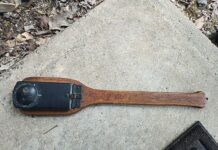“I’d passed the teacher test. I was being offered the job of an itinerant replacement teacher in northern Arizona. The school that was expecting me was in Red Lake, Arizona, five hundred miles to the west of our farm, and the only way for me to get there was (on my horse) Patches. I decided to travel light, bringing only a toothbrush, a change of underwear, a presentable dress, a comb, a canteen, and my bedroll. I had money from those horse race purses I’d won, and I could buy provisions along the way, since most every town in New Mexico and Arizona was abut a day’s ride from the next.”
— from Half-Broke Horses by Jeannette Walls
By JUDITH SUTHERLAND
Farm and Dairy columnist
One item on my wish list for Christmas was this “true life novel” about the life of Lily Casey Smith, written by her granddaughter, Jeannette Walls. It is a great glimpse in to the hardscrabble life of a young girl who persevered against all odds in the tough days while the Wild West was being tamed.
Lily was barely 15 when she was given the chance to teach at little schools in the middle of nowhere. The men were off fighting in World War I. This bright child had been scrambling to keep the family farm going while her father spent time writing letters to state representatives to protest such unimportant things as English spelling, her lady-like mother trying to keep her children genteel.
Adventure
It was up to Lily to break the horses, keep firewood stocked, miles of fence and out-buildings in good repair, the hired hands working. The opportunity to leave the farm to teach was exciting and worrisome all at once for this young girl.
“I figured the trip would take a good four weeks, since I could average about twenty-five miles a day and would need to give Patches a day off every now and then. The key to the trip was keeping my horse sound,” she writes.
She promised her mother she would keep her long hair tucked under her hat and her voice low.
“For insurance, Dad gave me a pearl-handled six-shooter, but the fact of the matter was, the journey seemed like no big deal, just a five-hundred mile version of the six-mile ride into Tinnie.”
Scenery
She writes of the scenery on the long trip in those southern parts of New Mexico as being “easy on the eyes.” It is interesting to try to picture the landscape both then and now, as the world changed so drastically in that part of the world.
She would see antelope and skinny range cattle, a lone cowboy on a gaunt horse, a wagonful of Mexicans.
“I always nodded and said a few words, but kept my distance.”
She rested when the sun got high, knowing she had to keep her wits about her and her horse safe from rattlers. The stories of Lily’s months of teaching in the middle of no man’s land in one-room schoolhouses proves interesting as she describes “teaching illiterate ragamuffins how to read.”
Discharged
Then the war ended. Just after Lily turned 18, the superintendent hunted her up to let her know the men were returning and the state of Arizona needed to give priority in hiring to those men, and he reminded her she didn’t even have a high school diploma. Lily knew this day would come, but it still threw her for a loop to be told she was now unqualified to do something she’d spent the last four years doing.
This is just one colorful chapter of a very interesting life. It is a reminder of the moxie required to survive in the early days of this country, and I wonder much of the time if we have trained this grit right out of the generations that followed.












